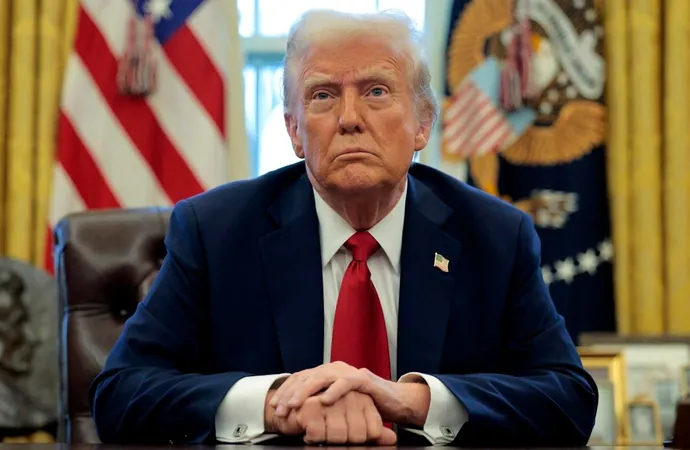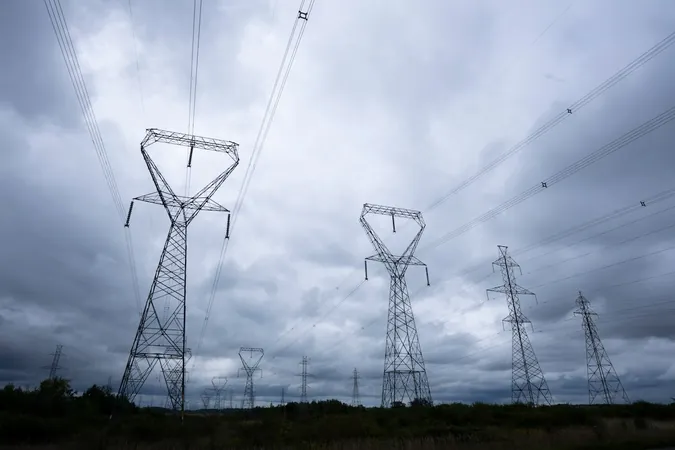
Wall Street Faces a Crypto Reckoning: Is Bitcoin About to Go Mainstream?
2025-04-06
Author: William
This week has seen Bitcoin and other cryptocurrencies experience wild price fluctuations as traders react to fears that President Donald Trump's ongoing trade war could trigger a catastrophic decline in their value. As uncertainty looms over traditional financial markets, the crypto world is becoming increasingly volatile, raising alarm among investors.
In a surprising turn of events, Bitcoin has outperformed the stock market, receiving unexpected support from U.S. Treasury Secretary Scott Bessent. His endorsement adds fuel to the fire as many on Wall Street are now declaring an "existential threat" posed by cryptocurrency to the financial system, as Trump pushes for significant new legislation in the crypto space.
Arthur Wilmarth, a law professor at George Washington University, articulated this concern during a Reuters interview, warning that taxpayers may ultimately bear the brunt of any fallout. This warning comes on the heels of Congress racing to pass a new stablecoin bill, which may allow interest to be paid to holders of these dollar-pegged digital currencies. Bo Hines, leading Trump's Council of Advisers on Digital Assets, emphasized last month that the White House aims to have this bill passed swiftly.
However, the stablecoin legislation has its nuances. A version making its way through the House forbids stablecoin issuers from paying interest, while a related bill in the Senate excludes only certain types of stablecoins from this prohibition. If legislation allows for interest-bearing accounts, it could inspire a mass exodus from traditional bank accounts to crypto-based options, heightening risks if such companies falter.
"Stablecoins are emerging as the first concrete blockchain application that could seamlessly integrate with traditional finance,” remarked Hina Sattar Joshi, a digital assets sales director at TP ICAP. She noted that the growing momentum in stablecoins is likely to draw significant institutional interest, highlighting their potential as a bridge connecting traditional assets with the crypto economy.
As Congress prepares to reconcile the two bills, lawmakers are faced with a crucial decision: will stablecoins evolve into the dominant checking account option favored by both banks and digital asset companies, or will they remain a mere niche product?
Meanwhile, the discourse around fair competition continues. Coinbase CEO Brian Armstrong voiced his concerns on social media, urging that the government should not favor one industry over another. He advocates that both banks and crypto companies should have the opportunity to offer interest to consumers, leveling the playing field.
The stablecoin market, now led by Tether's formidable $144 billion USDT, has witnessed explosive growth, drawing in major players from the financial technology sector. Companies like PayPal and Bank of America are racing to introduce their own stablecoins, lured by the extraordinary profits generated by Tether, which reportedly made $13 billion in 2024 through its extensive investments in Bitcoin, gold, U.S. Treasury bonds, and other financial assets.
As these developments unfold, the fate of cryptocurrencies remains precariously intertwined with traditional financial systems, making the coming weeks crucial for both investors and regulators alike. Will this be the moment Bitcoin and stablecoins break into the mainstream, or are we on the brink of a crypto crisis? Stay tuned for what’s next!









 Brasil (PT)
Brasil (PT)
 Canada (EN)
Canada (EN)
 Chile (ES)
Chile (ES)
 Česko (CS)
Česko (CS)
 대한민국 (KO)
대한민국 (KO)
 España (ES)
España (ES)
 France (FR)
France (FR)
 Hong Kong (EN)
Hong Kong (EN)
 Italia (IT)
Italia (IT)
 日本 (JA)
日本 (JA)
 Magyarország (HU)
Magyarország (HU)
 Norge (NO)
Norge (NO)
 Polska (PL)
Polska (PL)
 Schweiz (DE)
Schweiz (DE)
 Singapore (EN)
Singapore (EN)
 Sverige (SV)
Sverige (SV)
 Suomi (FI)
Suomi (FI)
 Türkiye (TR)
Türkiye (TR)
 الإمارات العربية المتحدة (AR)
الإمارات العربية المتحدة (AR)